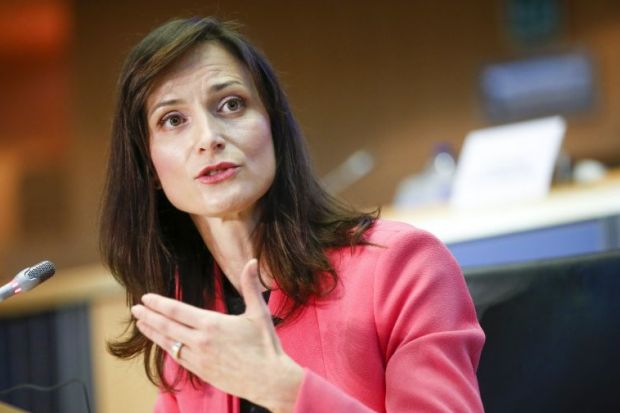The European Union has lost its political lead for research and education, leaving several flagship programmes in a “very fragile” state and vulnerable to budget poaching, according to Brussels experts.
Last week, Bulgarian media reported that Mariya Gabriel, the EU commissioner for innovation, research and education, had been asked to help form a government by her centre-right GERB party after a series of short-lived administrations.
On 15 May, Ursula von der Leyen, the European Commission president, confirmed that Ms Gabriel had resigned and that her portfolio would be split between commission vice-presidents Margrethe Vestager and Margaritis Schinas, with the former taking innovation and research and the latter education, culture and youth.
Ms Gabriel’s empty chair around the commission’s top table still leaves her work areas vulnerable to budget poaching and disruption by her former colleagues, according to Brussels lobbyists who spoke to Times Higher Education.
“The most exposed aspect is the forward planning to FP10,” said Jan Palmowski, secretary general of the Guild of European Research-Intensive Universities, referring to the unnamed successor to Horizon Europe, which will run from 2028 to 2035.
“The final year of Gabriel would’ve been a really focused period of identifying the priorities, getting buy-in from other parts of the commission for the budget, but also then thinking through how research, innovation and education relate to each other, and also to the wider budget demands,” said Professor Palmowski.
“The timing is probably the worst it could be, because had this been earlier in the political cycle any new appointment would’ve had more time to become familiar with the brief,” he added, referring to the time lost to appointing and confirming Ms Gabriel’s replacement and the purdah period before European Parliament elections in June 2024.
Dr Von der Leyen said Ms Vestager and Mr Schinas would take over Ms Gabriel’s work “with immediate effect” but did not set out a timeline for her permanent replacement, who will be nominated by the Bulgarian government.
Ms Gabriel’s biggest piece of unfinished work is Horizon’s successor. The staff she oversaw until today have been combing through thousands of consultation submissions and drawing up names for an expert group, both likely to be influential in shaping the multibillion-euro programme. Lidia Borrell-Damián, secretary general of the Science Europe umbrella body, said it was “super-important” that the plethora of opinions on the programme were fully considered.
Ludovic Thilly chairs the executive board of the Coimbra Group of universities. He said it was an “intrinsic weakness” of the temporary set-up that Ms Gabriel’s portfolio would be divided. “Everything is interlinked and therefore if they are well coordinated and equally supporting what Gabriel had been launching, then we’re fine; but this is very fragile,” he said.
He said the European University Initiative, an Erasmus+ funding programme for thematic university networks, was the “most vulnerable” of all Ms Gabriel’s files because much remains undecided about how EU will fund it through this and subsequent EU budgetary cycles.
Kurt Deketelaere, secretary general of the League of European Research Universities, said that while Ms Gabriel had been a “very dynamic commissioner, hands on, knowing her files very well, very approachable and open to comments by stakeholders”, it was clear that the goal of more closely linking the commission’s research and education departments was still a work in progress.
Under EU rules, Bulgaria must now nominate a substitute commissioner. Dr Von der Leyen has already lost Phil Hogan, her Irish trade commissioner, who was forced to resign after attending a lockdown-busting party on a golf course in 2020. His replacement was named less than a fortnight later, but shuffled to another brief.
The entire European Parliament will be up for election next year, with members then voting in the next European Commission president and approving each country’s commissioner appointments. Ms Gabriel has a week to try to form a coalition as prime minister.




